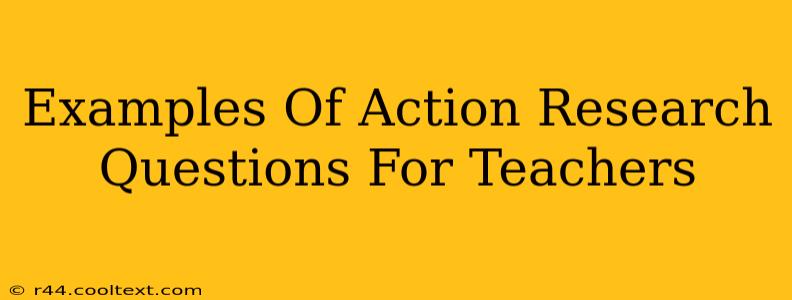Action research is a powerful tool for teachers seeking to improve their practice and the learning environment for their students. It allows for a cyclical process of identifying a problem, implementing a solution, and evaluating its effectiveness. Choosing the right research question is the crucial first step. This post provides examples of action research questions categorized by area of focus, helping teachers pinpoint relevant and impactful inquiries.
Choosing the Right Action Research Question
Before diving into examples, consider these key characteristics of a strong action research question:
- Specific and Focused: Avoid broad, unanswerable questions. The question should be clearly defined and manageable within the timeframe of your research.
- Actionable: The question should lead to concrete changes in your teaching practice.
- Measurable: You need a way to collect data and assess the impact of your intervention.
- Relevant: The question should address a real problem or challenge in your classroom or school.
- Aligned with your goals: The research should ultimately help you achieve your professional development goals.
Examples of Action Research Questions by Category
Here are some examples categorized for clarity:
Instructional Strategies:
- How will implementing collaborative learning activities impact student engagement and achievement in my 7th-grade science class? (Focuses on a specific grade and subject, and measurable outcomes.)
- What is the effect of using differentiated instruction on student performance in mathematics for students with diverse learning needs in my 5th-grade class? (Addresses diverse learners and a specific subject area.)
- To what extent does incorporating technology-based learning tools improve student understanding of historical concepts in my 10th-grade history class? (Focuses on a specific method and measurable outcome.)
- Will the use of think-pair-share improve student participation and comprehension in my English Language Arts class? (Simple, focused, and actionable.)
Classroom Management:
- How can I reduce disruptive behaviors in my classroom by implementing a positive behavior intervention and support system (PBIS)? (Addresses a common classroom challenge and a specific intervention.)
- What strategies are most effective for managing student transitions between activities to minimize wasted time and maximize learning time? (Focuses on efficiency and time management.)
- How does establishing clear classroom expectations and routines impact student behavior and overall classroom climate? (Addresses a fundamental aspect of classroom management.)
Assessment & Feedback:
- How does providing students with specific and timely feedback improve their performance on writing assignments? (Focuses on a specific type of assignment and measurable outcome.)
- What is the impact of using formative assessment strategies on student learning in my Algebra I class? (Focuses on formative assessment and a specific subject.)
- How can I improve the effectiveness of my grading practices to better reflect student learning and understanding? (Addresses a crucial aspect of teaching and student growth.)
Student Engagement & Motivation:
- How can I increase student participation and engagement in class discussions? (Focuses on a key element of active learning.)
- What strategies can I use to foster a more inclusive and supportive classroom environment for all students? (Addresses creating a positive and welcoming learning space.)
- How can I improve student motivation and self-directed learning in my classroom? (Focuses on intrinsic motivation and learning autonomy.)
Developing Your Own Action Research Question
Remember to tailor your question to your specific context, grade level, subject, and students. Start by identifying a challenge or area for improvement in your teaching practice. Then, formulate a question that is specific, actionable, measurable, and relevant to your goals. By carefully crafting your action research question, you'll pave the way for meaningful improvements in your teaching and ultimately, in student learning. Good luck!

